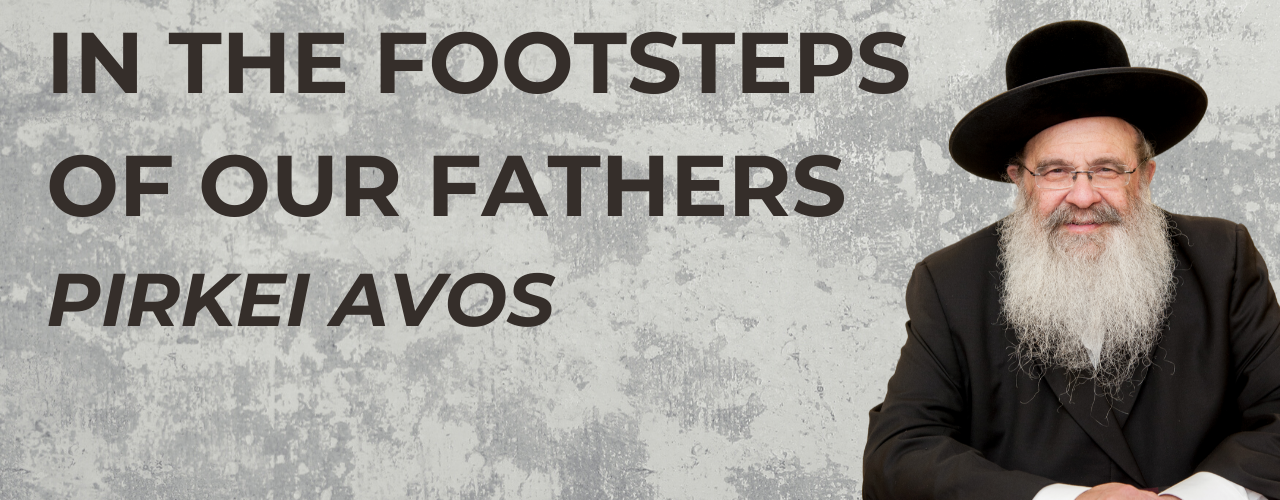STOP BLAMING, START SHARING
Print-friendly version
STOP BLAMING, START SHARING
Footsteps Of Our Fathers
Pirkei Avos Perek 2 Mishna 14
Harav Y. Reuven Rubin Shlita
Things are getting out of hand lately. The number of “kids at risk” seems to be swelling, homes are riven with Sholom Bayis problems, and wherever we turn we feel a degree of edginess in those around us. Our communal agendas are beset by intractable problems every day.
We end up casting about for someone to blame for all this turmoil: the teachers, the Rabbis, the society that we live in and any other soft target. The more we blame others, the more our hearts become filled with yet more pain. We talk ourselves into thinking that this is the worst of times, and that, too becomes the target of our anger. The tragic truth is that blame doesn’t help; in fact, it becomes part of the problem. When we cast blame on others, we obviate any need for us to take responsibility, and in a way, we close any path that may lead to some optimism. Guta Yidden used to say that “despair is not mentioned in the Torah as a sin, but hopelessness can far outweigh any specific aveiroh noted in the Torah.”
The sense of despair many feel when facing the ills of today lead us to shrug our shoulders, cast our eyes down in tears, and blame anyone and everyone for the situation. I would like instead to add a new word to the lexicon of communal discourse, “compassion.” Yes, a simple word but with an ocean of meaning. A look at any dictionary will tell you that this word is synonymous with: sympathy, empathy, concern, kindness, consideration and care. With such feelings we can perhaps begin to heal the open wounds. If we can have compassion for those we blame, for those we don’t understand, well, then perhaps we can start to turn things around. You see, blame is negative, it brings with it more anger, but compassion can be curative. We are all so tired of blaming, tired of waiting and blame only destroys hope!
Compassion in our hearts can keep us on the road towards some answers. These may come slowly, maybe too slowly, but they will come and we will feel uplifted by our efforts. No one feels positive when his heart is filled with darkness; blame only creates such murkiness, whilst compassion offers light. If we begin to empathise with those who are trying, then we can help and support, and with this we ourselves will rise above the deep despair that drags us down. Torah truth is about illumination and light, and its teachings should be clothed in just such majesty. No one child will return to his roots through our blaming others. No family will become imbued with peace through our censuring of others. Only if we walk together with compassion can we begin to hope.
This Mishna teaches us that “He (Rabban Yochanan ben Zakkai) said to them (his students): Go out and discern which is the evil path from which a man should distance himself………Rabbi Elazar says: a wicked heart.”
Being negative, blaming those who are in need of support may well be a sign of a wicked heart. It bespeaks a lack of empathy and good old-fashioned rachmonus; in a word, compassion. Rabbi Elazar then says that of all the teachings the students came up with, the lesson of distancing oneself from a wicked heart encompasses them all.
In these difficult and fast-moving times, we need to turn our hearts to compassion. All those groping for answers need our prayers, and in truth we all need each other’s prayers. We need to stop blaming and start sharing, and in this way, we can find a new path. The landscape of our world is moving, it always has done, and we must find a Torah of light that will be positive. Blame only tarnishes, whilst consideration can bring hope.
We learn Avos during the time of Sefira, a moment of time when we all are meant to reflect on how much sadness negativity has wrought on our people. Hate and lack of empathy can reap only further despair. Need anyone say any more?

